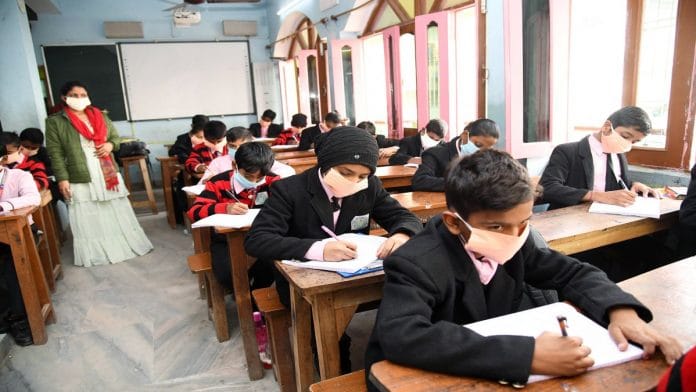New Delhi: The National Council of Educational Research and Training (NCERT) has come up with a draft training module to sensitise school teachers and staff about transgender children and their needs.
Called ‘Integrating Transgender Concerns in Schooling Processes’, the module focuses on children in the age group of 8 to 18 years.
It includes training teachers in creating an environment of inclusivity in the classroom, teaching in a way that does not enforce gender binaries, counselling students if they are unable to come to terms with their situation, and protecting them from violence inflicted against them because of their gender identity.
The module was developed last month by the Department of Gender Studies of NCERT along with the National Commission for Protection of Child Rights (NCPCR), the National Human Rights Commission (NHRC) and other academics.
Before this teacher-training module, the NCERT had in 2021 come up with another manual creating similar awareness among teachers. It talked about creating gender-neutral toilets, and explained the terms ‘cisgender’ and ‘agender’, among other things.
The manual was, however, pulled down after objections from the NCPCR.
Also read: CBSE lets Class 9 & 10 students do experiments at home, teachers welcome ‘self-learning’
‘Use gender-inclusive language’
“This module is based on a whole school approach for an inclusive environment and also suggests different pedagogical strategies and school activities across all stages and school subjects,” reads the document of the current module.
The module asks teachers to discontinue practices that “reinforce gender binaries in classrooms, co-curricular activities and other school spaces”.
“These include, but are not limited to, forming gender-specific queues and seating arrangements, stereotyping certain games and sports with a particular gender alone, pitching classroom interactions into gender binaries, etc,” the document explains.
It further asks teachers to apply age-appropriate methods to teach children in an inclusive manner. For 8 to 11-year olds, it calls for using gender-neutral toys and games like puppets, building blocks, puzzles, animals and other play material.
The document adds that children should be given freedom in choosing games (indoor and outdoor), colours, toys, colouring books, visuals and other teaching-learning material irrespective of the genders socially assigned to them.
Teachers should use stories, poems, songs, folk art, pictures and other means for briefly introducing gender diversity, and use gender-inclusive language like “students” and “children” rather than the binaries “girls” and “boys”, it advises.
‘Teach science in gender-neutral manner’
For children in the age group of 11-14 years, the module suggests that “science teachers while discussing plant and animal (and) human anatomies should be mindful that it does not reinforce gender binaries and include examples of intersex life forms”.
“The information regarding sex organs, sexual characters, etc., of intersex and transgender persons may be added by the science teacher. They can highlight that in all adolescents this process occurs differently. There is nothing to make fun of or get worried about,” it adds.
The module suggests that teachers should discuss about intersex persons developing differently despite growing up as “girl” or “boy”.
“When introducing transgender-inclusive curriculum, it is best to do so collectively as a school community, led by the administrators and school leaders. It is recommended that this decision be communicated through gender-specific professional development for educators and community members at the start of each academic year,” reads the document.
Problems faced by transgender children
The document points out that there is a lack of availability of a nationwide database on transgender children and adults in India.
It adds that through both primary and secondary sources, some challenges faced by transgender persons in schools have been identified, which include coming to terms with their own sexuality, internal challenges and confusions, emotional, behavioural, physical trauma due to changes/confusion leading to exclusion, various forms of violence including sexual abuse and molestation, problems in use of washrooms and uniforms, especially when children are confused about their identity, as well as mocking, bullying and teasing by others.
The module suggests ways in which teachers and school staff can intervene, create awareness and protect students from violence.
(Edited by Nida Fatima Siddiqui)
Also read: ‘She’ll think for everyone’ — flowers & hope as Bobby Kinnar becomes Delhi’s 1st trans councillor






